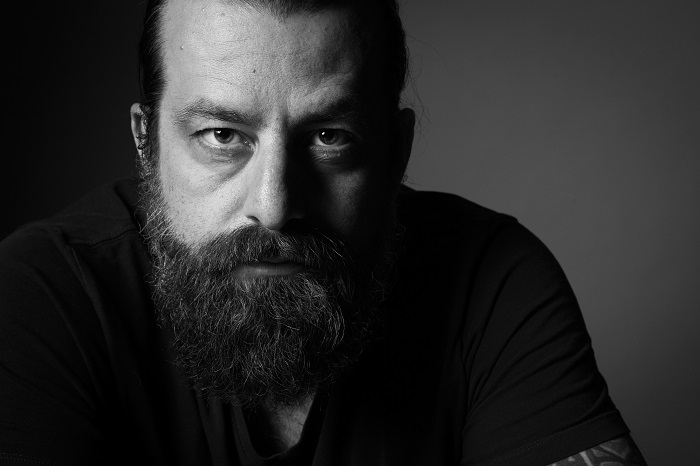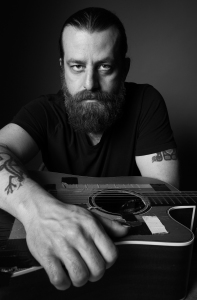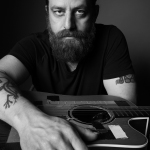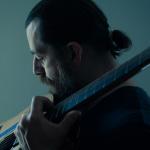
By Emily Gawlak
[W]ith music these days converging towards the center, growing more and more similar with each new electronic voice modification device, folk singer Sean Rowe ambles and nods his way on stage as a glaring anomaly. Rowe has a leathery, well-worn baritone that creeps into the ear as a hypnotic bulwark of masculinity, so deep it calls up visions of bourbon on the rocks, bare-knuckle boxing and John Wayne. To describe it as somehow mythic might seem a touch hyperbolic, but, like our most iconic balladeers of yore, his voice evokes.
As inclined as I am to favor my own flight-of-fancy origin story, that he simply emerged out of the dark night with a guitar and a freshly minted contract signed in blood, there’s a history behind that beard. Hidden behind Rowe’s strong, stoic looks and talents as a singer and songwriter is a self-effacing soul who spent not just years, but decades afraid of stepping into the spotlight, nursing fears that he wasn’t good enough, doubting that he had what it takes to make it in a musical career.
When I went delving into Rowe’s recorded work before about 2004, when he began playing at open mics around his hometown of Troy, NY, I came up empty. I couldn’t resist asking the artist, now in his forties, what explained the absence. “I just wasn’t confident, that’s the thing. I was very introspective, and I would write on my own,” he told me. And as for that resoundingly deep voice? “I was embarrassed by my voice when I was a kid… some people just have it at a very young age, and they are super confident in the spotlight and they thrive off of that. I wasn’t like that. It took me a while to warm up to the idea of actually throwing myself in front of a crowd and doing what I love to do by myself. It’s a very risky kind of a thing to do emotionally.”
It’s no wonder Rowe felt concerned about the emotional risk of performing. Whether he’s singing about his young son or a failed relationship, he approaches his songcraft with a brutal commitment to sincerity and depth. Even in our interview, he answered my questions with a contemplative eloquence. As masculine of a figure as he cuts, the core of his being as an artist, a father and a husband, houses a genuine emotional integrity and honesty. Frankly, it’s precisely this enigmatic duality– rugged frontiersman and soulful poet– that makes him so intriguing.
Clad in black, with long hair pulled back into a ponytail, a longer beard and a voice so low and clear it vibrates through a room, he emanates a severe, tortured quality. But as capable as he is of curating this Johnny Cash version of himself, he is just as easily able to dispel it, and occasionally when he sings in an upbeat, R&B laced vein, he reveals a performance style that is nothing short of flamboyant, shaking his head and wiggling his body, shirtsleeve riding up to reveal a tattoo on his forearm of a friendly, brightly colored lizard.

Like most young, burgeoning musicians, he began life as an avid music lover. As a teen, he tells me, “I wasn’t really listening to what my friends were listening to. I was listening to a lot of old blues and rhythm and soul and funk- a lot of American black music. That sort of shaped me. And of course folk music too.” Mirroring his diverse influences, his music moves back and forth between folk ballads and Delta blues, a genre felt heavily on his latest full length album, Madman. The record swings from the jangling, strutting “Shine My Diamond Ring” to the soulful, poppy “Desiree,” to the simple, heart-string tugging “My Little Man,” which he wrote for his young son.
Though Rowe has now built an impressive catalog of original music, he still relies on covers to round out his live sets and pay homage to the people and songs that have inspired him. Just by the nature of his booming voice, he reframes any song he covers with ease, even songs one might consider to be in his wheelhouse, such as Leonard Cohen’s “Bird On a Wire” or “1952 Vincent Black Lightning” by Richard Thompson. His most recent release was an EP called Her Songs, a cover album of hand picked songs written by women, such as Neko Case’s “Hold On, Hold On” and Lucinda Williams’ “Soldiers Song,” to which Williams responded ecstatically, “This is the best cover of any of my songs that anyone has ever done. I am completely moved.” But Rowe wasn’t in it for the praise. “It wasn’t a kitschy thing,” he carefully notes, “I really respect these artists and I really cherish their songs.”
Another element that sets him apart, and perhaps another symptom of his late entry into the game, is that he also seems to respect and cherish his fans. Though Rowe is signed with Anti- Records, a major label more than capable of funding his albums, he took to the crowdsourcing site PledgeMusic to fund a six month tour of house shows. With a sudden stretch of free time between recording, Rowe used Facebook to gauge interest in a series of shows that would be, in a word, intimate. “I thought, maybe I’ll see what kind of interest there is that might get people excited to have me in their own home… I must have done about a hundred [house shows] since last year, all over. On the west coast, east coast, Midwest.” He talks enchantedly about the strange nature of playing in someone’s home, and trying to reach his fans and convert new ones in such a personal way. “People are there to listen to something and to be moved, and to be entertained… it doesn’t work for everybody, cause it can be kind of weird. You’re in somebody’s house who you don’t know, and a lot of the people don’t know you because they’re just friends of the host. So it’s weird, it’s odd, and it feels completely natural at the same time.”
Clearly, such efforts are working to build not just a fan base, but a community, one that’s reinforced by the immense power and connectivity of his live performances. As he walked up to the stage at New York’s intimate downtown venue, the Mercury Lounge back in May, strangers clapped him on the back and greeted him like an old friend. Between his songs he joked and shared stories, completely at ease and in control.
Though Rowe has now been across the country and the globe with his music, he’s still learning about himself as an artist and a performer, chasing the spark with audiences large and small. “I think it’s really an invisible thing, and invisible process of this energy that happens between the artist and the audience,” he muses, “And it’s really so different every time. There’s nothing you can do to the venue, you can’t use a certain kind of sound system in to make it happen, or a demographic, it’s just that particular group and that space and time that make it special.”
Rowe’s crossbreeding of tenderness, ruggedness and a genuine commitment to his craft make him one of the most unique and enchanting figures in American music today. So Rowe will keep playing, keep growing as a musician– for himself, for us fans and for those yet to discover him. And maybe for some other, deeper drive as well: that slightly mad, pioneering leap into the unknown. “That’s the reason why I keep doing it. Because you never know what you’re going to walk into. That’s the only thing I’ve learned– that I haven’t learned anything.”






Be the first to comment!